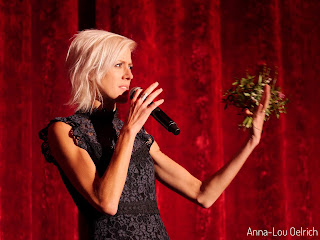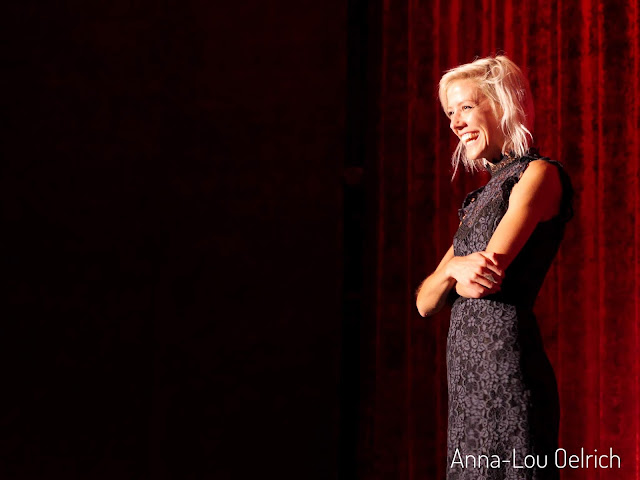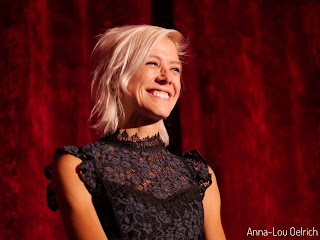An interview with Mo Scarpelli, the director of Anbessa.
Es ist 12:30 Uhr. Draußen regnet es in Strömen. Im Berlinale-Palast herrscht eine ruhige angenehme Atmosphäre. Im 3. Stock in einer Sitzlounge wartet Mo Scarpelli, die junge Regisseurin des Films „Anbessa“, auf mich. In dokumentarischer Form begleitete sie einen äthiopischen Jungen, der an der Grenze zwischen der alten typischen äthiopischen Lebensform und den Anfängen der Urbanisierung lebt. Gleich zu Beginn erzählt sie mir von der wunderbaren Vorführung am Vormittag im FaF, bei der viele Kinder waren und aufgeregte Fragen stellten. Ein inspirierendes Gespräch entwickelt sich.
Freie Generation Reporter: So, you have been to and shot films in Ethiopia before. Would you like to give us a little introduction on how that came to be?
Mo: I made my first independent short film in Ethiopia seven years ago and I have been travelling there pretty much every year for the last 10 years. One of my first jobs out of college was making video content and doing photography for an NGO (non-governmental organization). They were working in Ethiopia and that was the reason I went there in the first place. My film company still does project there. I started working on Anbessa when I was on a client project so I stayed longer to explore some possible scenes. I always had the desire to stay longer in Ethiopia trying to figure out a way to capsulate what is happening there.
fGR: Would you like to talk about your view about the country?
Mo: I was always very taken by their interesting history. Ethiopia is the only country in Africa that resisted colonisation. So, it has this pride in never being colonised, resisting westernisation, resisting a lot of things coming from the outside. That is fascinating for me as there are only very few places like this in the world. I am travelling a lot and I am starting to feel that the world is more and more becoming a „one size fits all“, which is really sad. This is for sure inevitable as there is migration of people more than ever before, so things are going to become symbiotic everywhere. I am also fascinated by people being caught in the middle of these large-scale narrative structures. In this case it is the idea of progress and how progress is really working out for everybody. That we should always want something bigger and better, that we should always be sprinting forward when it comes to technology. We are pretty much on the same page around the world that progress is a good thing. I wanted to explore what is lost in this sprint. Ethiopia is an apt place to explore that because there is still resistance to it as there are still a lot of traditional aspects of society. A lot of this can be lost when someone is telling you to live in condominiums like in Germany for example. I was wondering how the people there felt about this.
fGR: Do you think a lot of their traditional aspects will be lost in the future?
Mo: I am not sure because people have a way to keep some things alive. I do not know if it is a good or a bad thing. I just want to explore how it feels like for someone to be emotionally tied to his world but also wants to know other parts. That is why I was so curious about Asalif, the character in Anbessa. Abi is so tapped into his emotions and the way the world is. He is curious about technology, but he is also curious about stories and is entertaining fantasies in his head in order to have more fun and see where he can go and how he can stretch himself. People like that are like gold opportunities to be around in your life in general, but to be able to film with them and watch them in the space that is changing so fast, is something that can show us something about ourselves.
fGR: Asalif is not privileged. He is still living in a mud hut with his mother, who did not get any education, compared to the people in the condo. But at least he gets education. Do you think he has a chance?
Mo: I think it is hard. I am very sceptical about those narratives usually used by the international community but also by the place that is tracking its development. This will sound pessimistic I suppose, but the promise that every child that gets education will succeed is not the case. The truth is that there are millions – if not billions – of people in the world who, even if they had education, just do not have access to these structures that we built, to this globalisation that is happening everywhere. They do not actually have access to wealth and opportunity. They are told they do and they believe they do – and maybe they should, because otherwise it is a depressing life to live – but there is a lot of people who are just left out. There is just not enough money and jobs from the current structure we have to support every person to get a slice of the pie. So, I do not know what is going to end up happening for Asalif, but I think he is brilliant, he is gifted. The film is a testament to this sense I got from him. It was very emotional in terms of following him and going on my own journey with the film. He taught me that you can create your own reality in order to deal how bad life can be sometimes. I think we all need to see stories like that because of his resilience in the face of the fact that, even if he does not get a job or education leading to a top job or whatever it is that is considered successful, he has the ability to tap into something. And not just into the fantasy of the lion but in anything in the world he finds special. He has the ability to entertain his imagination, so he is going to survive and have a beautiful life. Concerning access to resources, the film team definitely would want to help to make sure he gets some kind of education. And my partner Misken is almost like a father to him so he is making sure Asalif is alright.
 fGR: How did you deal with the stigma of a white person coming to Africa filming the people’s lives there?
fGR: How did you deal with the stigma of a white person coming to Africa filming the people’s lives there?
Mo: I think it mostly needs time. Often the people in the streets were throwing stones at me and Asalif. They were getting him out of the trash and me out of the condo. They did not like that I was filming a boy in the trash. I am obviously a foreigner and a white girl with a camera coming into their space. I see him digging through the garbage as part of the narrative but also as a joy. He is singing while he is doing it, finding treasures, but of course it looks like I am filming some poor child searching through the trash. So, I understood when people were mad at me. I also understand that people are mad at the international view of their country. Ethiopia has really gotten the short end of the stick when it comes to conveying the complexity of the culture. Unfortunately there is a huge stigma there, that everyone is desperate and people are starving, but this generally is not the case. Obviously, everything is more complex than it appears. Ethiopia specifically is very resistant to anyone telling their story for them, so it was difficult. Albert Meisl said „The only thing you need for a documentary is your camera, of any kind, and love in your eye.“ That is a huge principle for me, especially with people from other cultures: Giving them eye contact when I first meet someone to letting them know I am not a threat. It is amazing how much you can convey via body language and over time. If you keep coming back they realise that you are actually interested in this kid. But with the condo it was a bit difficult because there were always new people every time so we always had to sort it out again. I was getting a bit annoyed by that. But it makes sense. People are sceptical and they should be.
fGR: Did you normally film alone?
Mo: Yes, I like being alone while filming. I do not like on-set translations. I mostly just follow and oftentimes did not even know what they were talking about. After the first year I learned the most important terms and could differentiate whether this actually got anything to do with the film topics of the hyena, the lion or politics. It was a lot of shooting of body language. My editor really edits based on body language, too. So, that was an important point for me, because we really wanted to catch the energy of the kid through his motions. Translations most of the times were not as important as the actual reactions to the environment. Asalif also does not talk a lot himself but rather watches his surroundings, so it was important to catch that.
fGR: In the film he often is pictured alone. Was that for stylistic means?
Mo: He is a really independent boy. I think I saw a lot of me in him, too. And I also saw that there is a beauty and solace in being alone. You can find yourself. He has this with his electronics and he wants to be left alone by everyone, even his mom. The flip side is that you are always kind of isolated and watching people from the outside. However, this is not necessarily a bad thing. Asalif is not seeking to be part of the group. He is not lonely. He is just alone. And I feel like that a lot in my life, too. I mean, obviously I love watching people as an art form. But I also like feeling like an outsider and being on the outskirts of something. Then I can learn from people who are unlike me and try to see myself from their perspective. I think Asalif learns a lot out of experiences that other people do not. He really is intelligent but also emotionally intelligent. He is the kind of kid that looks at the stars and trembles because he is terrified of what is possible in the world and that the universe is vast. That is what drives his creativity and makes him a really special person but that also means that he kind of is in his own head.
fGR: How was the situation you found yourself in in Ethiopia?
Mo: When I was filming there was a lot of tension between the government and the people, because the government starting building all these condos and in this process did all those land seizures. The people did not like it. They revolted against that, so there was a crisis for a while. Most of the film I actually shot in a state of emergency. There was a lot of tension that was also caught in the scene with the bar. For a lot of scenes that later did not turn out to be relevant it meant to be going to unsafe places and hiding the camera because it was actually illegal to be shooting during that time.
fGR: How did you feel in these situations? Did you feel unsafe?
Mo: I have both the Italian and American passport so I did not really worry about me. The biggest threat was always to my local crew. If they had said something and I recorded it and the government had found out… I think a lot of people coming in, like journalists, are facing ethical dilemma. They are doing these important stories that matter, bringing information to the outside world. However, the people in the stories are sometimes put to great risk because of this work and they do not always understand it. My biggest fear always is to do harm through not understanding because I come from the outside or have privilege and this way put someone in danger. That is why it is so important to have people who tell you the truth instead of what you want to hear. It was so important to know what the people in the bar said about me as an American. And it was not always nice. But that is what I need to hear. I need to know why they have this kind of perception of me.
fGR: The film is shot in a documentary form. How much of the movie was scripted and how much did you follow Asalif’s lead?
Mo: Well, a straight-up observation of his everyday life honestly would have been quite boring. He does the same thing every day. But it also is not boring to him, so it would have been a service to his reality. Through talking to him I found out about stories and his dreams and the symbolism of the lion and what it meant to him. Some of the scenes were reenactments of his dreams. Although it was fictionalised and I did not know what it was, I wanted to approach it in an authentic way. So I basically went with the camera and told him to show me what happened in his dream. That was when he was just doing random stuff, because that is the way dreams work. They are very strange. But through showing what happened it was easier to harness his real imagination. I wanted to use the film as a way to push both of us. I wanted to understand his world more and the way he saw the world and once he trusted me with that, it meant pushing him to go off and have these adventures, sometimes with kids, to the condo or the bar. So I wanted to go to places where there is tension. From there on it is purely documentary in the way that I am only following what happens. There is for example the scene in the bar where the guys tell stories about the hyenas. So just to wait for that to happen, while Asalif is in the state of paying attention would waste time, so we planted him there to ask about hyenas. I did not know which stories they would tell, how Asalif would react, but would just watch to keep it authentic.
fGR: How different did the film turn out compared to your initial ideas?
Mo: When I first thought about this film I was more thinking about an essay film and I am so glad that Asalif found me, when I was sitting there, telling me his stories. I think for me in order to understand the world I have to see it in micro perspective. As soon as it gets macro I get very disillusioned. So I would talk to many voices and was thinking about this essay film, but I just did not have passion for it, because I did not see and understood the world in the macro scale. So in the course of this film with Asalif I realised that going micro is the way for me to understand the world. That is also why being a journalist and working on articles about big wars just did not work out for me. I do not believe that the macro is ever telling a story to me or anyone. So, stories with meaning is the only way to learn about the world. These stories only come by getting really close. And it also is a way to learn about yourself. To me this film feels close to his experiences of his coming of age.
fGR: When did you decide you had enough footage for the film?
Mo: So I was coming to Ethiopia over a period of two years but it really was this intense phase of six weeks where we would film every day after school when he was free and we could build up on the day before. A lot of the film is about us going out together, being on this journey together and that happened in a small amount of time. So even though I had a lot more footage I knew when the ending was right, although I did not know yet how exactly it would look like. Which is interesting, because I normally instantly know when I shot the scene. One moment when we were sitting near the forest I realised how much he had changed and how much I had changed since working together. And I thought: We did it.


